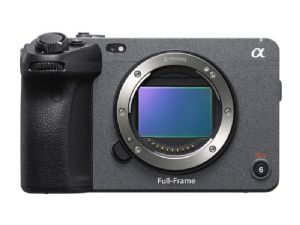
Production Profile | The Creator
Gareth Edwards & Sony

Gareth Edwards has long been a proponent and practitioner of lean, nimble filmmaking. His debut feature film, Monsters, was shot on a production budget of less than $500,000 and edited on a laptop. So it comes as no surprise to learn that his latest offering, The Creator, was made with ‘prosumer’, off-the-shelf equipment from the outset.
That isn’t to say that this project certainly was short of ambition. It boasts many of the trademarks of classic sci-fi megamovies, from huge battle sequences to dreamlike, futuristic technologies. Set in 2070, 15 years after a nuclear detonation in Los Angeles starts a war against Artificial Intelligence, the story follows an ex-special forces agent (John David Washington). Embarking on a perilous mission, he’s been charged with finding the creator of a weapon that could spell the end of the war—and victory for whichever side possesses it. Hardly the plot summary you’d expect for a film shooting with prosumer tools.
Edwards discussed the project and his intentions with his collaborator from Star Wars film Rogue One: cinematographer Greig Fraser, ASC ACS. Together, they soon chose Sony’s FX3 as the camera that would carry the movie, despite it retailing for less than typical Hollywood cinema cameras cost for a single day’s rental.

But, after multiple delays brought about by the pandemic, Fraser was unable to join the production as its principal cinematographer after all. Instead, he replaced himself with Oren Soffer—a young filmmaker with a keen visual style, honed across numerous music videos, shorts and narrative features.
Soffer was surprised by the choice of the FX3, seeing it as just a small video camera inside a stills camera body. Not necessarily his first choice of equipment for a feature film with a production budget of $80 million. However, after screening test footage shot by Fraser, Soffer was astonished. He knew that the FX3 would stand up to the image quality demands of a Hollywood production: “The camera is just capable of incredible imagery… It blew me away.”

While the test footage impressed him, Soffer jumped at the chance to undertake some test filming himself—in Thailand, where principal photography was due to take place. There the FX3 outshone other, more expensive cinema cameras in a very specific way: its ability to handle low-light settings.
Soffer was able to film test shots in moonlight, capturing beautiful night scenes without any additional lighting. A tight schedule meant this wasn’t possible for principal photography, but the high sensitivity of the FX3 still meant that Soffer could shoot captivating scenes at dusk and in the early evening.
In fact, this low-light capability actually expanded the shooting slots each day. Edwards and Soffer found that they had an extra 15-20 minutes of dusk for filming, stretching out the ethereal ‘blue hour’ that many cinematographers revere. The opening scene of the movie was filmed during these extended dusks, with soldiers emerging from the sea and walking onto a beach in a soft, nighttime glow.
Later in the film, there’s a dramatic shootout that was filmed high up in Bangkok’s Rosewood Hotel, overlooking the city. This sequence was filmed using just the light from the city itself, as it washed into the room from outside, creating a unique mood for the action. And this simply wouldn’t have been possible with a camera that didn’t have the FX3’s level of light sensitivity.

While image quality was paramount to Edwards and Soffer, the FX3’s compact design unlocked more benefits for the filmmakers. Edwards often prefers to hold and operate the camera himself on his films, making the FX3 the ideal size and form to support his preferred shooting style. Long takes were far more feasible, often using lightweight gimbals instead of larger support rigs and cumbersome equipment. Overall, around half of the shooting ended up being handheld like this, with much of the rest achieved using a small dolly or Technocrane.
The price point of the FX3 brought another advantage: the production could afford to buy several units. These were then mounted onto various rigs, including a drone, saving valuable time and allowing the team to move faster through the busy production schedule.

Overall, the combination of the nimble style of filmmaking and Soffer’s ability to use natural light have resulted in a striking movie experience. Edwards’ new project has a bristling energy and a realistic look that’s reminiscent of classic sci-fi films like Blade Runner. And it provides ample proof that ‘prosumer’ filmmaking tools can not only be used for major motion picture projects, they may actually open up new creative possibilities for filmmakers.

Sony FX3 Full-Frame Cinema Line Camera
- Compact full frame Cinema Line camera from Sony
- 4K Full-Frame Exmor R BSI CMOS Sensor
- 4K QFHD high-frame-rate 120fps recording
- XAVC-S 4:2:2 10-bit internal recording
- 4K 16-bit RAW output via full HDMI terminal
- ISO expandable to 409600
- 15+ stop dynamic range with S-Cinetone profile
- S-Log3/S-Gamut3, S-Gamut3.Cine
- Real-time Eye AF, Touch tracking
- Weight approx. 715g
- Detachable XLR top handle included




